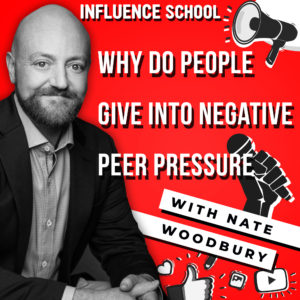
Download Now!
Influence is all around us and it’s important to understand why people give into negative peer pressure. That’s why we’ve invited Dr. Paul Jenkins to explain to us what peer pressure is and how we handle them. Tune in to learn more about this.
Welcome back. Today, we’ve got a fun conversation on why people give in to negative peer pressure. Paul Jenkins here. Positivity psychologist. -Mmm. -Knows a lot about this. That’s we’re going to talk about today. So, when we’re talking about peer pressure, we’re talking about… We’re influenced by what other people think or what other people want us to do. Why is it that we’re so influenced by that? Why do we give in to that? -Probably more than we should be. -Yeah. -Right? Or more than we want to be because we’ll get it in our head we want to do things a certain way. And then we find that we’re influenced by other people. And then we change our behavior. I think it comes down to 2 basic human motivators. There’s pleasure and there’s pain. -Okay. And of the 2 Nate, which one do you think is the most powerful and changing your behavior? -Well, if there’s pain to avoid, I think the pain. -You nailed it. -It’s pain. And I’m the positivity guy. I want to say, “Oh, it’s pleasure. You know we’ll do things because it’s good for us.” No, it’s all about pain. -Mm-hmm. Whatever our pain is motivates us more than anything that could bring us pleasure. So you think about it your brain is going to do more to avoid pain than to seek pleasure. And if you don’t believe this go put your thumb and a vise and try to think of your favorite things. That’s not how our mind operates. And it’s a survival mechanism. -Okay, so if we’re if we’re connecting this to peer pressure, where there’s some type of pain that we perceive is going to happen if we don’t… -Yes. -We don’t give in. -And there are fears involved too. You think about the fear of rejection, for example. -Mm-hmm. -Because rejection is painful. -Yes. And this is probably the most obvious one as it relates to peer pressure. Rejection if I don’t do what they want to do then they will reject me. They’ll toss me aside. And that causes me pain. I don’t want to have pain. -So thinking about it. If I were hanging out with a for friends and the friends started to do an activity. Maybe they found a can of spray paint. I just make all this stuff. They’re going to straight painting a wall and I’m thinking… “Come on, Nate.” -So, I’ve got I’ve got two discomforts that I’ve been thinking of. 1 is I don’t want to be left out or I don’t want to like want them to feel like… -Right. -…you’re not a part of us. But at the same time I’m like, “Well, I don’t want to vandalize this property. I don’t… That’s that’s not part of my value system.” So, it’s like I have to choose the pain. The lesser of the 2 pains I guess is what I’d be choosing there. -Well, think about that too because if what we’re being influenced to do is in alignment with our core values, then we don’t call it peer pressure. -Right. -We call it positive influence. Right? But if it goes… If it causes a conflict like what you were describing. I’m morally opposed to vandalizing property. But my friends want me to go spray paint this wall. Now I have a conflict. And so whichever pain is greater will win over. Rule of the day. -I like that. -So, as a viewer, you might be wondering, “Okay, why are we talking about peer pressure on the name Woodbury Channel?” Well, we talked… We talked a lot about influence. And so I really like how you made a kind of a comparison. Peer pressure, positive influence. Maybe 2 sides of the same coin or maybe that the same thing just in a positive situation and in a negative situation. -Right. Depending on whether it aligns with your values or not. And if it doesn’t now you’re in conflict. And so the pain starts to jockey for position. And whatever pain is greater is going to determine your behavior. -Okay, so other part other videos that I filmed with you on Live On Purpose TV, you can check out Paul’s channel we talked a lot about the space that’s between like a stimulus and our in our response or our action. -Right. -So, there’s a space where we can think and decide, “So, I’m wondering how does that apply here with with peer pressure?” Because what I’m really wanting to get at is what do we do about it? You know, how can we overcome this peer pressure to not, you know, not be in this more dilemma or not make the decisions that are against our judgment. -You brought up such an important point, Nate. because this space. I attribute this to metacognition. Now, metacognition is a made-up word. We make up words in psychology because it makes us feel smart. But if you think of cognition at this level. It just means thinking. Metacognition is that higher level. It’s thinking about thinking. And that creates the space that you’re talking about. That space actually puts us back into choice. But there’s a dilemma that we have when it comes to pain. Your brain is designed to keep you alive. Okay? Survival mechanisms. So, you must avoid pain because well, that threatens your existence. Pain can be delayed or it can be immediate. Which one do you think your brain is going to be most concerned about? -Pain. -The immediate pain. Yes. So, the immediate pain that’s right in your face is going to carry more weight. Even if it’s not ultimately more painful to you or destructive. So, you used the example of spray-painting the wall. You know, the kids that are being influenced by their friends to go out and vandalize. The immediate pain is rejection from the group. The long-term pain could be incarceration. Which one is worse? But in the moment, your brain will always seem now pain as being greater than later pain. So, when we go to the metacognition and we think about our thinking, that gives us an opportunity to really study the situation. -Mm-hmm. -And to think it through really which pain is greater. So, that you can make a good decision. Because in reality going to jail, that’s… That is a greater pain but it’s perceived as less just because it’s down the road. -It’s off in the future. -I might… I might not get caught. -I had a client who wanted to stop smoking. He knew… He had seen all of the videos that they show in health class about the black lungs and you know, dying early and all that. He knew. He reads the warning. The surgeon general’s warning on the pack. He knew that this was going to kill him. But not today. When he got a diagnosis of… I can’t even remember was it was a lung related issue. It may have been emphysema or lung cancer. When he got that diagnosis and the doctor told him, “Look, you’re dying. You’ve got to quit today.” He quit today. The pain became immediate. See? As long as it’s off in the future, I know this will kill me but not today. What do we do with our diet or exercise plan? I know I need that. You know in the pain, you’re going to pay for your health today or tomorrow. Okay? It’s more expensive tomorrow but we don’t think about that because it’s off in the distance. So, this delay factor is something that metacognition allows us to actually assess more accurately. -Cool. -And that’s… That’s how you can avoid the trap of I’m going to do what’s easy now at the expense of something that’s going to cause me even more pain later on. -So, very helpful. So, if we were to kind of even turn this conversation another direction, you know I work with a lot of influencers. I believe in the power of influence and as spider-man’s uncle, you know tells them that with great power comes great responsibility. -Yes. -Thinking about it from the influencers perspective, we want our influence to be positive influence. We don’t want to ever I jump into the realm of peer pressure. Like are we in… Meaning, even if it’s aligned with our values, our values can’t be imposed upon somebody else’s values. So we’re you know, as far as peer pressure or whatnot. You have any any thoughts on that side? -It’s a huge responsibility to be in a position of influence. I think all of us need to take the time to… Like we were saying earlier. To study the situation why are we trying to influence people? Is it to get gained some kind of money? Some kind of reward? Or is there some greater purpose or mission that drives our influence? And that… And that has to do with our own core values. But it has to do with being sensitive to what those core values are for other people too. And making sure that that’s in alignment. Because it is a responsibility to know that what you say, what you do, what you put out on YouTube is going to potentially influence someone’s behavior. And you hear news stories all the time of people who did stupid boneheaded things because of something they saw on YouTube. So, we got to be careful with what it is that we’re putting out there in terms of the core values that drive it. Having a purpose. Live on purpose. -That’s right. So, I’ve really enjoyed our conversation of diving into not only why people give in to peer pressure but what we can do about it and how it relates to influence. Thanks for being here. -Thank you. If you enjoyed this type of an episode, make sure to comment below so that we can create more like this. Obviously, if you haven’t subscribed yet, it’s probably something you should do. We’ll see you tomorrow.
